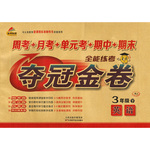题目内容
Once upon a time, a rich man wanted to make a trip (旅行) to another town. He tried not only to take things to sell but also to take money to 1 things with. He 2 to take ten servants with him. They would 3 the things to sell and the food to 4 on their trip. Before they started, a little boy ran up to 5 and asked to 6 with them.
The rich man said to the little boy, “Well, 7 may go with us. 8 you are the smallest, the thinnest and the weakest of all my 9 , you can’t carry a 10 load (担子). You must 11 the lightest one to carry.” The boy thanked his master and chose the biggest load to carry. That was bread.
“You are 12 .” said his master, “That is the biggest and the heaviest one.” The boy said 13 and lifted the load gladly.
On the trip they walked for days and at last they got to the town. All the servants were tired 14 the little servant. Do you know 15 ? Most of the bread was eaten during the trip and a little was left when they arrived at the town.
1. A. eat B. buy C. change D. get
2. A. decided B. liked C. hoped D. tried
3. A. take B. bring C. carry D. borrow
4. A. cook B. eat C. buy D. drink
5. A. them B. the servants (仆人) C. the road D. the rich man
6. A. stop B. stay C. go D. talk
7. A. you B. he C. I D. they
8. A. Since B. If C. Because D. But
9. A. family B. guests C. servants D. things
10. A. heavy B. light C. small D. difficult
11. A. eat B. choose C. pick up D. understand
12. A. brave B. right C. clever D. foolish
13. A. sorry B. nothing C. angrily D. good-bye
14. A. besides B. of C. except D. with
15. A. who B. him C. that D. why
1. B。这位富人不仅带了东西去卖,而且带钱去“买”东西。解这道题时要注意将句中and前后的内容进行比较。
2. A。根据他的想法,他“决定”要带十个仆人。这件事完全可以由他自己决定,所以没有必要“希望带……”或“努力带……”,故C、D不合题意。
3. C。carry在句中意为“携带、运送”;take 意为“带走”;bring意为“带来”。本句意为“他们将运送要卖的东西和在路上要吃的食物”。下文的第10、11两题所在的句子也有提示。
4. B。参照第3题。
5. D。一个小男孩来找这位富人,要求和他们一起走,故选 the rich man。
6. C。参照第5题。
7. A。富人同意小男孩随行。
8. D。此句和上文是转折关系,意为“但是你是我的仆人中最小的、最瘦的、最弱的一个,你不能挑重担”,故选but。
9. C。参照第8题。
10. A。参照第8题。
11. B。此句意为“你要选择挑最轻的担子”,“pick up”意为“捡起”,不合文意,故选choose。
12. D。主人看到这个小仆人选择了最重的担子,感到他很“愚蠢”,故选foolish。。
13. B。听了主人的话,小男孩“什么也没说”,而是高兴地挑起了担子。
14. C。由于小男孩的聪明,“除了”他自己,其他仆人都累坏了。
15. D。Do you know why? 用在文章最后用来引出原因,告诉读者其中的奥妙。

 夺冠金卷全能练考系列答案
夺冠金卷全能练考系列答案
| |||||||||||||||||||||||||||||||||||||||||||||||||||||||||||||||||||||||||